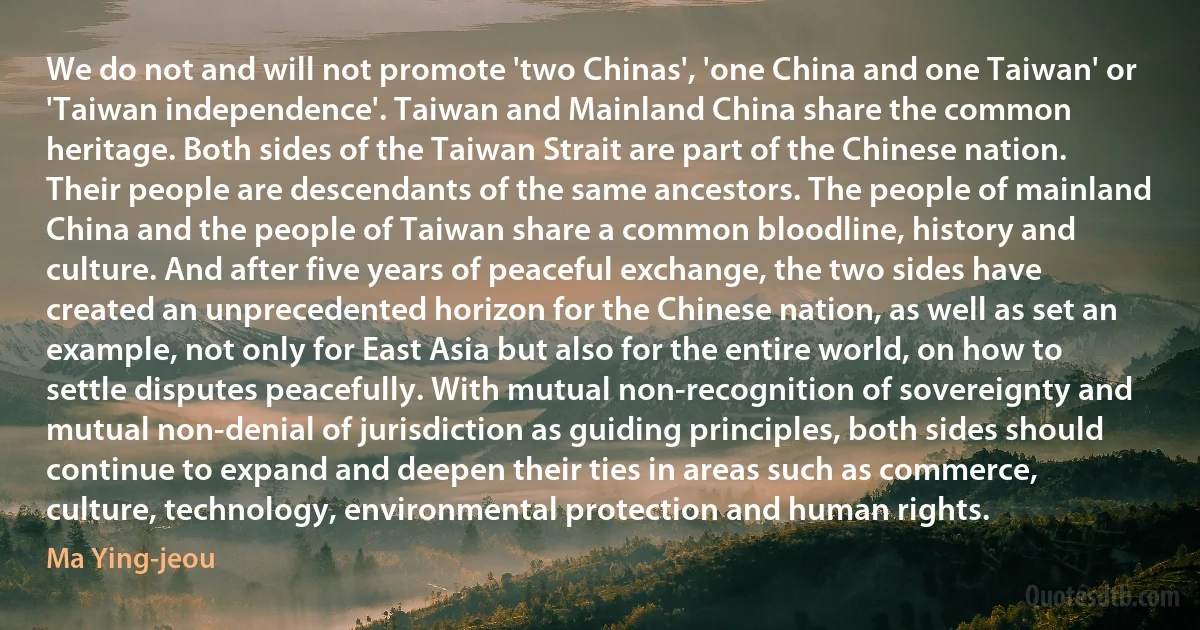
We do not and will not promote 'two Chinas', 'one China and one Taiwan' or 'Taiwan independence'. Taiwan and Mainland China share the common heritage. Both sides of the Taiwan Strait are part of the Chinese nation. Their people are descendants of the same ancestors. The people of mainland China and the people of Taiwan share a common bloodline, history and culture. And after five years of peaceful exchange, the two sides have created an unprecedented horizon for the Chinese nation, as well as set an example, not only for East Asia but also for the entire world, on how to settle disputes peacefully. With mutual non-recognition of sovereignty and mutual non-denial of jurisdiction as guiding principles, both sides should continue to expand and deepen their ties in areas such as commerce, culture, technology, environmental protection and human rights.
Ma Ying-jeouRelated topics
common continue east entire example five history human jurisdiction mainland nation people set settle should share sovereignty technology well world asia years bloodlineRelated quotes
If Christ were to walk in this world today, do you know what would happen to Him? He would be placed in a mental institution and given psycho-therapy, just as would His Saints. The world would crucify Him today just as it did 2000 years ago, for the world has not learned a thing, except more devious forms of hypocrisy. And what would happen if, in one of my classes at the university, I would one day tell my students that all the learning of this world is of no importance beside the duty of worshipping God, accepting the God-man who died for our sins, and preparing for the life of the world to come? They would probably laugh at me, and the university officials, if they found out, would fire me-for it is against the law to preach the Truth in our universities. We say that we live in a Christian society, but we do not: we live in a society.

Seraphim Rose
The communist peasant-nationalist regimes of Asia, relying on the Führerprinzip, extreme ethnocentric nationalism, and racism (and the ultimately grotesque in antimodernism in the case of the Cambodia of the Khmer Rouge) seem to some to represent the fascistization of communism. There is no doubt that, as discussed earlier, fascism and communism share many fundamental characteristics, and Russian spokesmen delight in applying the same words to China as to Nazi Germany: ‘petit bourgeois' policy, ‘bourgeois nationalism,' ‘military-bureaucratic degeneration,' ‘subservient obedience' of the masses, ‘anti-intellectualism,' ‘voluntarism,' ‘subjectivism,' ‘autarchic' policies that try to place ‘surplus population' on ‘foreign territories,' concluding that ‘the Maoist approach in no way differs from fascism.

Stanley G. Payne
The United Front Government's neighbourhood policy now stands on five basic principles: First, with the neighbours like Nepal, Bangladesh, Bhutan, Maldives and Sri Lanka, India does not ask for reciprocity but gives all that it can in good faith and trust. Secondly, no South Asian country will allow its territory to be used against the interest of another country of the region. Thirdly, none will interfere in the internal affairs of another. Fourthly, all South Asian countries must respect each other's territorial integrity and sovereignty. And finally, they will settle all their disputes through peaceful bilateral negotiations. These five principles, scrupulously observed, will, I am sure, recast South Asia's regional relationship, including the tormented relationship between India and Pakistan, in a friendly, cooperative mould.

I. K. Gujral
I am under no illusion that our present strategy of using means short of total war to achieve our ends and oppose communism is a guarantee that a world war will not be thrust upon us. But a policy of patience and determination without provoking a world war, while we improve our military power, is one which we believe we must continue to follow....
Under present circumstances, we have recommended against enlarging the war from Korea to also include Red China. The course of action often described as a limited war with Red China would increase the risk we are taking by engaging too much of our power in an area that is not the critical strategic prize.
Red China is not the powerful nation seeking to dominate the world. Frankly, in the opinion of the Joint Chiefs of Staff, this strategy would involve us in the wrong war, at the wrong place, at the wrong time, and with the wrong enemy.

Omar Bradley
We do not need a large land force. The present size of our regular Army is entirely adequate, but it should continue to be supplemented by a National Guard and Reserves, and especially with the equipment and organization in our industries for furnishing supplies. When we turn to the sea the situation is different. We have not only a long coast line, distant outlying possessions, a foreign commerce unsurpassed in importance, and foreign investments unsurpassed in amount, the number of our people and value of our treasure to be protected, but we are also bound by international treaty to defend the Panama Canal. Having few fuelling stations, we require ships of large tonnage, and, having scarcely any merchant vessels capable of mounting five- or six-inch guns, it is obvious that, based on positions, we are entitled to a larger number of warships than a nation having these advantages.

Calvin Coolidge
